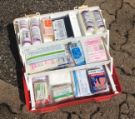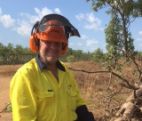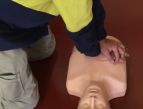
First Aid courses in remote Indigenous Communities
CPR and basic first aid is a one (1) day course, if your workplace has machinery or your staff drive to remote locations this training could be very useful. We focus on the skills and knowledge that you need during an emergency situation, many accidents can happen in the workplace. This training can be delivered in remote Aboriginal communities, our trainers have many years experience working in isolated Northern Territory communities and understand the challenges.
Provide first aid is a two (2) day course, if your workplace has machinery or your staff drive to remote locations this training could be very useful. This course can help you manage many accidents that can happen in the home or workplace and can be delivered in remote Aboriginal communities. Our trainers have many years experience working in isolated Northern Territory communities and understand the challenges, call me to discuss training options. Have a look at Remote first aid
We can provide all first aid courses in Darwin, Katherine, Tennant Creek or Alice Springs. You chose the courses that suit your workplace they can be a one day or two day or three day first aid training. All Nationally accredited units of competencies. Have a look at trainers experience in first aid
CPR is a four (4) hour course, if your workplace has machinery or your staff drive to remote locations this training could be very useful. We focus on the skills and knowledge that you need during an emergency situation, many accidents can happen in the workplace. This training can be delivered in remote Aboriginal communities, our trainers have many years experience working in isolated Northern Territory communities and understand the challenges.
Remote first aid is a three (3) day course, if your workplace has machinery or your staff drive to remote locations this training could be very useful. This course can help you manage many accidents that can happen in the home or workplace and can be delivered in remote Aboriginal communities. Our trainers have many years experience working in isolated Northern Territory communities and understand the challenges, call me to discuss training options. Learn more about remote first aid.
We can travel to your location, whether it be a Indigenous community or cattle station. Remote first aid is vital for remote workers, if you are outbush or working hundreds of kilometers from a hospital this course is essential. If an accident occurs this training will help you and your workmates and make your work place safer. We focus on the skills and knowledge that you need during an emergency situation in remote locations.

We can travel to your location, whether it be a Indigenous community or cattle station. Remote first aid is vital for remote workers, if you are outbush or working hundreds of kilometers from a hospital this course is essential. If an accident occurs this training will help you and your workmates and make your work place safer. We focus on the skills and knowledge that you need during an emergency situation in remote locations.
First aid course is a "must" for all remote workers, if you are outbush or working hundreds of kilometers from a hospital this course is essential. If an accident occurs this training will help you and your workmates and make your work place safer. We focus on the skills and knowledge that you need during an emergency situation. CPR and basic first aid training near you.
Ian van Munster has worked at Saint Johns as a first aid trainer for eight (8) years and is now employed by Train Safe NT to provide first aid training at remote communities. Ian has lived in the Territory his whole life and has many years experience with indigneous people. He has worked in many areas of training such as running a driving school and inducting new staff into truck driving. Ian has brought with him many years of first aid training, he has provided fist CPR, first aid and remote first aid to many isolated communities.

Mr Van Munster the First Aid trainer, using a chainsaw, multiple skilled.
The units of competencies for first aid can be:
- HLTAID001 Provide cardiopulmonary resuscitation
- HLTAID002 Provide basic emergency life support
- HLTAID003 Provide first aid
- HLTAID005 Provide first aid in remote situations

What will I learn in a provide first aid course?
- DRSABCD
- Chain of survival
- Unconscious breathing casualty
- Cardio pulmonary resuscitation (CPR)
- Automated external defibrillator
- AED Terminology and safety
- Good Samaritan Act
- Infection control
- Choking
- Shock, stroke, wounds, bleeding
- Chest pain, asthma, allergies, anaphylaxis
- Risk and safety management
- Burns, fractures, sprains, strains, dislocations
- Head, neck, spinal, chest, abdominal
- Facial and eye injuries
- Heat and cold induced illnesses
- Poisons, bites and stings
- Head to toe assessment
This first aid training is the most popular first aid course in Australia, more workers do this courses than any other training Australia wide. Learn more about courses in Darwin

What will I learn a CPR first aid course?
- DRSABCD
- Chain of survival
- Unconscious breathing casualty
- Cardio pulmonary resuscitation (CPR)
- Automated external defibrillator
- AED Terminology and safety
- Good Samaritan Act
- Airway obstructions
The unit of competency is: HLTAID001 Provide cardiopulmonary resuscitation
Ask a student - Testimonial
I did my first aid course about 20 years ago and I have upgraded it about every 4 to 5 years now they say you’re supposed to upgrade your CPR every three years which I haven’t I have let slip but it’s still really good to do the first aid course and just constantly remind yourself of what you have to do. I did have an incident where a person collapsed in front of me and I put them into the recovery position just made sure they were breathing when they fell over they knocked their head on the concrete so I think they’re were a little bit unconscious and once they were breathing in the recovery position I just let them sit there and they slowly came to but I’m glad I had the first aid skills behind me because it did pay off.
I did the first aid course with St John’s initially and then after that I did it with various private providers. The first aide course that Train Safe NT run was very flexible because you can choose whatever unit you want so you could do a one day course or a two day course or a three day course. You can do these courses in Darwin or remote communities so if you have a workforce that needs first aid contact Train Safe NT.
My experience with them is that they were very good, the certificates were posted out within about 4 days, bear in mind that all the USIs have to be sorted out first. The first aid course brought a lot of people together but I only see each other occasionally so it was a good chance to chat catch up and meet, a bit of professional development and put a face to the email. So the first aid course with Train Safe NT paid off with other benefits I got to catch up with all my workers again which is good and to see the boss actually doing some work that was quite funny because he stuffed up the CPR the first time so we all had a good laugh. Peter Mudge.